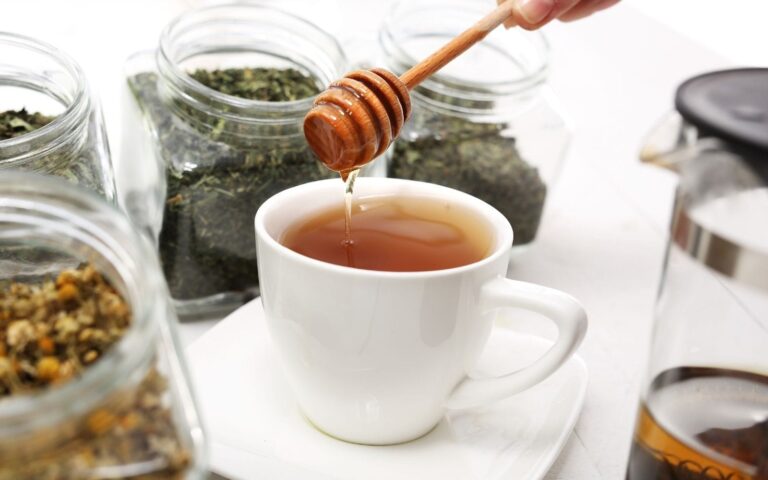9 Best Teas For Headaches

Disclosure: This post may contain affiliate links. If you click on a link we may make a small commission at no extra cost to you. You can read the full disclosure here
Best Teas For Headaches
There are many different types of headaches, each with its own unique set of symptoms and causes. The most common types of headaches include tension headache which is often caused by stress or muscle tension. Migraine is a type of headache that is frequently accompanied by nausea, vomiting, and/or sensitivity to light and sound, and more rarely, cluster headaches that tend to occur in groups or cycles.
Should You Drink Caffeine When You Have A Headache
Caffeine is a stimulant that can help to alleviate headaches by reducing inflammation. It can also improve alertness and focus, which can be beneficial when coping with pain and discomfort. Caffeine has even been shown to increase the effectiveness of certain pain relievers. However, in some people, caffeine can actually bring on headaches or increase symptoms so it’s best to consume it in moderation and be sure to avoid it completely if you have a sensitivity to caffeine.
Any type of headache can seriously disrupt your daily routine and cause you significant distress at times. There’s nothing quite like the feeling of relief when your headache finally goes away.
It’s amazing how something that was causing you so much pain can often just disappear and leave you feeling normal again. It’s always a reminder of how good it feels to be healthy and pain-free. So let’s take a look at the best teas for headaches so you’re well prepared the next time you get a headache.
Best Teas For Headaches

When you’re looking for something relaxing and restful to help ease your discomfort there is something about the ritual of making and drinking tea that is soothing and calming, even when you’re feeling under the weather. The warmth of the cup in your hands, the steam wafting up to meet your face, and the gentle scent of the tea all work together to create a sense of comfort – so let’s see if you can find some relief with these tasty and effective tea varieties.
1. Chamomile Tea
Chamomile tea is a versatile drink that can be enjoyed for its many health benefits. It contains chamomile flowers, which are high in antioxidants and polyphenols. These properties help to fight inflammation, promote relaxation, improve sleep quality, and reduce anxiety symptoms.
Chamomile tea has been shown to lower blood pressure levels and relieve minor headaches associated with stress or tension headaches. In addition to these therapeutic effects, drinking chamomile tea regularly has anti-inflammatory properties that can help reduce the risk of chronic diseases. So if you’re looking for an analgesic tea without any caffeine content that’s great for your overall well-being, then give chamomille a try!
2. Lavender Tea
There is a strong correlation between anxiety and headaches. This is where lavender tea can be beneficial. The calming properties of lavender can help to ease the tension that often leads to headaches. In addition, the anti-inflammatory properties of lavender can help to reduce the associated pain and inflammation.
The fragrance of lavender is also known to boost mood and promote relaxation. In addition, the scent of lavender has been shown to improve sleep quality and reduce the symptoms of insomnia which can in itself lead to the development of headaches.
3. Peppermint Tea
Peppermint tea is a great option if you’re looking for an herbal remedy that can help ease your headaches as it contains compounds that can help to reduce the intensity and duration of headache pain. These compounds include menthol and terpenes, which are both thought to have anti-inflammatory properties. Additionally, peppermint tea has been shown to improve cognitive function in those with chronic headaches.
If you’re looking for an effective way to relieve your head pain without using over-the-counter medications or resorting to caffeine pills, then drinking some peppermint tea may be a great option for you. It can help to relax the mind and improve moods which can have a positive effect on the body’s natural ability to alleviate pain. So if you suffer from frequent headaches, give peppermint tea a try as one of your remedies!
4. Ginger Tea
Ginger is a popular ingredient for mild to moderate headaches, and there are many people out there that swear by its ability to relieve pain. It has been shown to reduce inflammation in the brain, relieve constipation and stomach ache, ease migraine symptoms, and even improve sleep quality.
This delightful spicy brew is well known for its potent anti-spasmodic effects and its purported benefits for improving circulation and increasing blood flow to the brain, which can also help to reduce the severity of headaches.
Brewing your own ginger tea allows you to customize the strength and flavor of your drink so that you get maximum benefits for minimal effort. So if you’re looking for an effective way to treat your migraines or chronic head pain, try drinking some ginger tea!
5. Clove Tea
The health benefits of spicy cloves are numerous. For centuries, traditional healers have used cloves to treat a variety of ailments, including digestive problems, pain relief, and respiratory issues. Cloves are packed with antioxidants and anti-inflammatory compounds that can help to boost the immune system and protect the body against disease, and drinking clove tea is a great way to take advantage of these benefits.
Cloves contain eugenol, which has been found to be an effective analgesic, probably best well known for its ability to relieve toothache pain. Drinking this spicy brew may also help to improve blood flow thereby potentially helping to ease headaches and migraines.
6. Turmeric Tea
There is something about turmeric tea that just hits the spot. Whether I am feeling under the weather or just need a pick-me-up, this drink always does the trick. Not to mention, it has a host of health benefits that are well-documented. For example, turmeric is a powerful anti-inflammatory agent, which can help to reduce swelling and pain throughout the body. It is also known to boost cognitive function and improve digestion.
Turmeric tea has long been used as a remedy for headaches in traditional medicine. The active compound in turmeric, curcumin, is a potent antioxidant, anti-inflammatory, and analgesic agent. A recent study found that curcumin can help to reduce the severity of headaches and might therefore be considered a complementary medicine for migraine patients. So adding this vibrant spice to your diet may be a tasty and effective way to ease your pain and discomfort.
7. Rosemary Tea
This wonderfully fragrant herb has a wide range of therapeutic properties and rosemary tea can be an excellent way to make the most of them. It is a rich source of antioxidants and anti-inflammatory compounds, which are thought to help boost the immune system and improve blood circulation.
Rosemary is a flavorsome source of vitamins and minerals and is a traditional remedy for soothing headaches and relieving muscle pain. It is also believed to help relieve stress, which is a common cause of headaches and can be enjoyed alongside meals to aid digestion and reduce bloating. This can be really beneficial for those of us who are prone to headaches as a result of poor digestion.
8. Willow Bark Tea
Willow bark tea has been used for centuries as a natural remedy for headaches. The active ingredient in willow bark, salicin, is a close relative of aspirin. It has anti-inflammatory and analgesic properties, making it beneficial for treating a variety of conditions, including headaches, muscle pain, and arthritis. It may be particularly helpful in relieving tension headaches and migraines as it helps to ease pressure and relieve those associated painful and sometimes debilitating symptoms.
Willow bark tea is not particularly palatable on its own as it has a slightly medicinal taste. To improve the flavor, you can add sweeteners such as honey or sugar, or citrus fruits such as lemon or lime. You can also try adding other herbs or spices to your brew if you need to mask the slightly bitter taste, increasing any health benefits that you get from your brew.
9. Feverfew Tea
Feverfew tea has long since been used as a home remedy for a variety of ailments, including headaches, anxiety, and stomach problems. The main active ingredient in feverfew is parthenolide, which is thought to have anti-inflammatory and anti-spasmodic properties. Parthenolide is also believed to block the release of certain chemicals in the brain that are involved in migraines.
Feverfew tea has a quite distinctive bitter taste that may take a little getting used to. However, many people find that the benefits of drinking feverfew tea outweigh the bitter taste. Alternatively, combining feverfew tea with chamomile or lemon balm makes the flavor more palatable and may also enhance the health benefits.
The Difference Between A Migraine And A Headache

There are a few key differences between migraines and headaches. For one, migraines tend to be much more severe, and can even be debilitating. They also often include additional symptoms like nausea, vomiting, and sensitivity to light and sound. Headaches, on the other hand, are usually less severe and don’t come with the same range of symptoms. Additionally, migraines tend to be recurring, while headaches are usually one-off.
The exact cause of migraines is unknown, but they are thought to be caused by a combination of genetic, lifestyle, and environmental factors. Treatment for migraines typically involves medication and lifestyle changes. If you are dealing with persistent headaches, you should consult a medical professional to rule out any serious underlying causes.
Alternative Home Remedies For Headaches
If no serious causes are found for your headaches, you may be able to manage them with a number of effective home remedies such as taking a warm bath, applying a cold compress to the forehead, massaging the temples, and drinking plenty of fluids. Over-the-counter medication, magnesium supplements, relaxation techniques, and lifestyle changes may also help.
Some people find that sleeping in a darkened room, practicing breath work, or using therapeutic essential oils can reduce symptoms. You may also want to evaluate your stress levels and make sure that you’re getting enough sleep. If your headaches continue to disrupt your life, you may want to see a doctor to help you find the right treatment.
Conclusion
There are many natural and effective ways to treat headaches, and adding tea to your diet can be one of them. Herbal teas are full of antioxidants and have anti-inflammatory properties. They can help to relax the body and mind, which will help to relieve stress and tension, and can even help to prevent headaches.
Drinking herbal teas regularly can also help to keep your body healthy, strengthen your immune system, and improve digestion. So next time you have a headache, reach for a cup of tea and see if it works for you.
Is Green Tea Good For Headaches?
Green tea has been shown to be effective in reducing the severity of headaches. The active ingredients in green tea, including caffeine and catechins, are thought to be responsible for its headache-reducing properties. Green tea is generally well-tolerated and has few side effects. However, it is important to note that green tea contains caffeine and should be avoided if you are sensitive to this substance.
When Should I Worry About A Headache?
There are many different types of headaches, and the appropriate course of action to take depends on the type of headache experienced. If you experience a headache that is severe or lasts for an extended period of time, it is important to consult a doctor to rule out any underlying medical conditions. Additionally, if you experience a headache that is accompanied by other symptoms, such as fever, nausea, or vomiting, it is also important to consult a doctor.
Can Drinking Tea Cause Headaches?
There is some evidence to suggest that tea can cause headaches in some people. It is thought that the caffeine in tea may be responsible for this effect. Caffeine is a known trigger for headaches and migraines in some people. Therefore, it is possible that tea may cause headaches by affecting the caffeine levels in the body.






